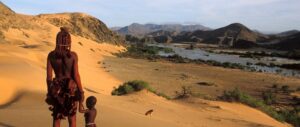Sustainable Use of Wildlife: It’s The Law!
Webinar – The Nagoya Protocol and the Rights of Local Communities
Resource Africa (RA) recently launched a policy position paper entitled Indigenous Flora and Fauna, African Resources for African People, wherein we argued for the inclusion of the sustainable use of wildlife into the UN Convention of Biological Diversity’s (CBD) Nagoya Protocol. To discuss the implications of this position paper in more detail, Leslé Jansen (our CEO) moderated a webinar with five panellists that each brought a different perspective on the issue.

Ademola Oluborode Jegede:
A need for African approaches to conservation
Professor Ademola Jegede of the University of Venda introduced the position paper and provided some of the key concepts that inform these arguments. In particular, he noted that the tensions between human rights and environmental activism are needless, since the sustainable use of biodiversity provides for human livelihoods and biodiversity conservation.
He further challenged the “silo approach” to conservation that divides plants and animals, different ecosystems, and the local communities that use these resources. This approach is based on Western notions of the environment, which is not consistent with an African view, as Prof Jegede points out: “In African cosmology, we see the environment as indivisible, we do not separate plants and animals in terms of how traditionally we take care of them, because we know how dependent our lifestyle is on these two entities.”
He further considered, “The environment is conceived in the Western sense by establishing protected areas, restriction or banning of commercial use of wildlife, centralising the control of wildlife, combined with stringent legislation. All these approaches to protecting the environment are counter-productive because they exclude the interests and rights of indigenous peoples and local populations from the discussion.”
These concepts apply to the Nagoya Protocol, in that there is no reason why plant genetic resources should be the only parts of the environment that trigger Access and Benefit Sharing (ABS) in African countries. The sustainable use of wildlife is based on indigenous knowledge and animals and plants are indivisible resources within the African cosmology. African governments can therefore apply the Nagoya Protocol by including wildlife resources in their ABS regulations.

Maxi Pia Louis:
The role of hunting in Namibian community conservation
Maxi Louis provided her perspective within the context of the Community-based Natural Resource Management (CBNRM) in Namibia. She confirmed that all of the natural resources are managed by communities, without making a distinction between fauna and flora: “As Africans we are very closely linked to our natural resources, that is our heritage, that is what we are. The communities depend on those resources, which includes water, biodiversity, land, wildlife, fish and any other natural resources.”
She noted that the use and governance of these resources provides both tangible and intangible benefits to Namibian people. Tangible benefits included jobs, meat, and income for community organisations that deliver a variety of benefits to their members. Although the intangible benefits are often overlooked, Ms Louis emphasised that these were just as important, as communities were able to take ownership of their resources and build their capacity to manage it responsibly. Based on her experience, she says, “people who become leaders in their communities later become political leaders, and they develop leadership skills in their communities.”
In response to the movement to ban hunting, Ms Louis first explained that “hunting has always been part of what we do, our communities have always done this in a very sustainable way and we need to encourage them to continue doing that.” She went on to emphasise the possible unintended consequences of such bans: “In my country, if you take hunting away, that is when you are contributing to poverty. You take the bread and butter from these communities, that means you are contributing to poverty.”

Ivan Vaalbooi:
COVID-19 exacerbates community disempowerment in South Africa.
The issue of preventing wildlife use contributing to poverty was further highlighted during Ivan Vaalbooi’s presentation on his community’s experience with hunting restrictions in South Africa. Mr Vaalbooi’s community, the Khomani San in the Kalahari, were granted several farms adjacent to and land within the Kgalagadi Trans-frontier Park (KTP) after a successful land claim. However, the Community Property Association (CPA) has been placed under government administration, which limits this community’s decision-making power over the resources on this land.
During the COVID-19 lockdowns in South Africa, these problems became a crisis, as Mr Vaalbooi recalls: “During the start of the hard lockdown in South Africa, a lot of community members and people in South Africa faced hardships that came with it, more specifically the communities who were already in a very impoverished state were very severely impacted, which was the case for my people in the Kalahari.” Travel restrictions meant that people could not go to town to purchase food and medicine, but had to rely on local shops that had increased their prices during COVID.
The traditional leaders wanted to remedy the situation by hunting some of the wildlife occurring on the community’s land and distributing the meat to the most vulnerable members of their community. Despite the leaders’ efforts to engage the CPA prior to the hunt, the CPA denied permission to hunt. Mr Vaalbooi picks up the story: “But the leaders then decided that based on the severity of the situation at the moment, and also how the elderly and people living with disabilities in the community were struggling, that the hunting should go ahead and the meat provided to the community members. After that a criminal case was opened and a disciplinary hearing instituted by the CPA.” This case underlines the disempowered state of this community and illustrates the real issues behind preventing the sustainable use of wildlife on community land.

Malidadi Langa:
Decolonising conservation in Malawi.
Malidadi Langa of Malawi reflected on the colonial history of conservation in his country, particularly the colonial concept of “fortress conservation” that creates hard boundaries between protected areas and rural communities. Fortunately, in recent years, “Malawi passed a new national wildlife policy, which contains provisions for community-based natural resource management.” Mr Langa continues, “Over the last 5-10 years, we have seen some positive gains in terms of communities taking part in conservation, particularly of wildlife along the protected areas.”
Despite these gains, communities living alongside protected areas still feel the wrath of the law: “If they are caught cultivating in protected areas then they are subjected to all sorts of punishment as provided under the law – jailed, fined. The fines are not small, they are quite stiff. The jail terms are not little, they are quite long. Some of these issues are bordering on human rights issues.” Although the government is now engaging with local communities, these issues need further discussion to find ways to accommodate Malawi’s growing human population while still conserving its natural heritage.
Mr Langa nonetheless remains optimistic in the light of increasing wildlife populations within the protected areas and the new CBNRM approach in Malawi. He considers that as both wildlife numbers and the human population continue to increase, the government may consider introducing the sustainable use of wildlife in future. He reflects, “What will be interesting is how communities will be engaged in the process.” He further noted that Nagoya Protocol might play a role in mediating this process by recognising the rights of local communities to Access and Benefit Sharing.

Betty Kauna Schröder:
Linking local communities with international law
As the keynote speaker, Kauna Schröder brought a wealth of experience as the chairperson of the compliance committee for Nagoya Protocol, and the Namibian focal point for the Protocol. She focused especially on Article 8(j) of the Nagoya Protocol, which instructs Parties to the CBD to create national legislation that is relevant to each country’s situation. Ms Schröder indicated that in southern Africa, particularly among those countries that have CBNRM programmes, there is no reason to exclude the use of wildlife resources from implementation of the Nagoya Protocol.
Ms Schröder charted a way forward from here: “It is important for us to focus on what it is that benefits communities, it is important for us that we speak against anti-sustainable use policies, and give our arguments in terms of why it is important that we focus on sustainable use of these resources. The Nagoya Protocol has done an excellent job in terms of what it has presented to us as Parties so far in terms of plant genetic resources and species, we need to now continue building on those successes for wildlife as well.”
While there are provisions within the Nagoya Protocol and other instruments of international law, Ms Schröder acknowledged that local communities are generally unaware of these provisions and rights. She called for further capacity building amongst indigenous people and local communities throughout Africa, which would enable them to lobby their respective governments and fight for their rights.
Recognising the views and experiences expressed by the community representatives at the webinar, Ms Schröder highlighted the need for stakeholders who support these communities to collaborate. Going further, she stated, “We need to make sure that we defend regulated trophy hunting as an example of sustainable use of wildlife that aids biodiversity conservation. We need to make sure that the wildlife economy and livelihoods of local populations and indigenous people are taken care of. We need to make sure that we protect the rights of our communities.”
Conclusion
The webinar brought together several strands of thought and themes around the issue of the sustainable use of wildlife. These themes included human rights, the unnecessary conflict over the sustainable use of wildlife, and the application of international law at national and local levels. The way forward involved building greater leadership capacity within communities, developing policies within African governments to expand their implementation of the Nagoya Protocol, and creating international awareness on the rights of local communities to use and manage their resources. Ultimately, the delegates reiterated our key message – African resources for African people.



